
PTT Global Chemical Drives Growth Through Integrated Biorefinery, Expanding Biochemical and Bioplastic Products
PTT Global Chemical Public Company Limited (GC), a leading global force in the chemical industry, is expanding its capabilities with a focused push towards sustainable biorefinery solutions. Building on the nation’s inaugural production of Sustainable Aviation Fuel (SAF), GC is working to further enhance the potential of its biorefinery. This initiative aims to cater to the growing demand for high-value bio-chemicals and bio-polymers across various industries, all while supporting the global call for sustainable alternatives. Through this strategic expansion, GC is not only reinforcing Thailand’s bio-industry but also boosting its international competitiveness by leveraging advanced technologies and innovative practices designed to reduce carbon footprints and drive sustainable growth.
The Path to Sustainability and High-Value Products
GC’s commitment to sustainability is exemplified by its launch of Sustainable Aviation Fuel (SAF) production. The first phase of SAF production has seen an output capacity of 6 million liters per year, marking a significant milestone in the company’s bio-based energy solutions. Building on this success, GC is now extending its expertise into refining and advanced chemicals by adopting a co-processing approach that integrates seamlessly with existing distillation units. This innovative process transforms used cooking oil (UCO) into valuable bio-chemicals and bio-polymers, helping to meet the growing demand from industries that are seeking more sustainable, eco-friendly materials.
The company has already started the commercial production of three important products derived from its biorefinery process:
- Bio-Propylene: This is used in the production of packaging materials, hard plastics, children’s toys, and automotive parts. Bio-Propylene is a key player in GC’s efforts to provide more sustainable materials for the packaging and automotive industries.
- Bio-BD (Bio-Butadiene): A vital raw material for the rubber industry, Bio-BD is mainly used in the production of tires and sports shoes. This product enhances the sustainability of essential everyday items like footwear and vehicle tires.
- Bio-PTA (Bio-Purified Terephthalic Acid): Widely used in the production of polyester fibers and PET plastic bottles, Bio-PTA helps to reduce the carbon footprint associated with plastic packaging and textile production.
These products serve critical markets in the chemical, rubber, and packaging industries, providing sustainable alternatives to traditional fossil-based materials. But GC’s ambitions extend far beyond these three products. The company is also working to develop other bio-based materials like:
- Bio-Naphtha: A key raw material in the production of chemicals and plastics, which will further diversify GC’s product range.
- Bio-PE (Bio-Polyethylene): This product will serve industries that require plastic bags, films, and food packaging, offering a renewable alternative to conventional polyethylene.
- Bio-MEG (Bio-Monoethylene Glycol): Bio-MEG is another key product under development, which will be used in the production of polyester fibers and PET plastic bottles, aligning with GC’s goal to supply more sustainable materials for the textile and packaging industries.
A Step Towards a Circular Economy
GC’s biorefinery is not just an innovative solution for the chemical industry; it also plays a significant role in addressing global environmental challenges. By utilizing agricultural waste and raw materials, GC is creating products that perform similarly to fossil-based materials, but with a much smaller carbon footprint. This approach supports the global shift towards a circular economy, where waste is minimized, and resources are reused to create new products. Through this, GC helps reduce waste, improve community income, and foster sustainable growth that benefits both the economy and the environment.
The company’s biorefinery operations also contribute to solving waste management issues in Thailand. By turning used cooking oil into valuable products, GC is creating a pathway for waste materials to be repurposed into high-value chemicals, thus helping to reduce the environmental impact of waste disposal. Moreover, this process offers a tangible solution to the growing demand for renewable, bio-based raw materials.
GC’s biorefinery initiatives also align closely with Thailand’s BCG (Bio-Circular-Green) economy model, which promotes the use of bio-based and circular materials in a way that supports sustainable economic development. By embracing the BCG framework, GC is playing a pivotal role in the nation’s efforts to transition towards a more sustainable and green economy.
High-Quality Bio-Based Products with International Certification
In recognition of its commitment to sustainability, GC’s bio-based products have earned the ISCC PLUS (International Sustainability and Carbon Certification Plus) certification. This certification is a global standard for ensuring the responsible use of bio-based and renewable raw materials in manufacturing processes. By securing this certification, GC’s bio-based products meet the rigorous sustainability requirements demanded by environmentally conscious consumers and businesses.
The ISCC PLUS certification offers further credibility to GC’s commitment to producing environmentally friendly products, positioning the company as a trusted partner for industries and brands seeking to enhance their sustainability credentials. This certification also assures customers that GC’s products adhere to the highest standards of sustainability, from sourcing raw materials to product end-of-life.
A Strategic Focus on Innovation and Expansion
As part of its strategy to expand its low-carbon and high-value businesses, GC is committed to continual research and development in biorefinery technologies. The company recognizes that the market demand for sustainable materials is only set to grow, and by continuing to innovate and collaborate with both domestic and international partners, GC is positioning itself as a leader in this space.
In line with its strategy, GC is forging new collaborations with partners across the globe. These partnerships are designed to develop integrated chemical solutions that not only meet the immediate market needs but also contribute to long-term sustainable development. Through these alliances, GC aims to enhance its technological capabilities and expand its range of bio-based products.
The company is also focused on strengthening its position in key global markets, recognizing that the need for sustainable alternatives to fossil-based materials is not just a local concern but a global one. By expanding its operations and increasing its product offerings, GC is poised to meet the growing demand for green and renewable materials across various industries worldwide.
Achieving Sustainable Growth
At the heart of GC’s biorefinery efforts is the goal to drive sustainable growth. The company’s commitment to creating high-value, low-carbon products reflects a broader strategy of reducing environmental impact while maintaining strong business performance. As it continues to scale its biorefinery operations, GC is mindful of its role in fostering economic growth that is both environmentally and socially responsible.
Mr. Tossaporn Boonyapipat, President of GC, emphasized the company’s dedication to advancing its biorefinery capabilities. He said, “GC is not only the first SAF producer in Thailand, but we are also continuing to build on the potential of our biorefinery to offer biochemical products and bioplastics that can replace fossil raw materials. We focus on using renewable resources, such as used vegetable oil, to produce high-value products, in line with the concept of the circular economy and Thailand’s BCG economic model. This strategic focus on sustainability and innovation will drive our efforts to expand our high-value and low-carbon business.”
As GC continues to innovate and develop new bio-based products, the company remains committed to reducing its carbon footprint and providing sustainable solutions to the industries it serves. The growth of its biorefinery operations is just the beginning of a larger movement towards a more sustainable future for the chemical industry. By focusing on the production of high-value, low-carbon products, GC is setting an example for other companies in the chemical sector to follow, proving that it is possible to achieve both economic success and environmental responsibility.
With a clear focus on sustainability, innovation, and collaboration, GC is poised to play a pivotal role in shaping the future of the chemical industry. By advancing its biorefinery capabilities and expanding its product range, the company is helping to drive the global shift towards sustainable materials and circular economies, all while contributing to the broader goal of reducing the carbon footprint of industrial processes.
In conclusion, GC’s efforts in the biorefinery space reflect its commitment to sustainability, innovation, and leadership in the chemical industry. Through its focus on bio-based products and low-carbon solutions, GC is well on its way to becoming a global leader in the development of sustainable materials. By continuing to build on the success of its SAF production and expanding its biorefinery capabilities, GC is creating a future where both the economy and the environment can thrive together.






